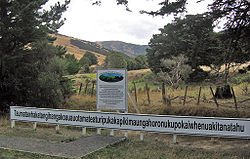Creations of long words
Coinages
In his play Assemblywomen (Ecclesiazousae), the ancient Greek comedic playwright Aristophanes created a word of 171 letters (183 in the transliteration below), which describes a dish by stringing together its ingredients:
Henry Carey's farce Chrononhotonthologos (1743) holds the opening line: "Aldiborontiphoscophornio! Where left you Chrononhotonthologos?"
Thomas Love Peacock put these creations into the mouth of the phrenologist Mr. Cranium in his 1816 book Headlong Hall : osteosarchaematosplanchnochondroneuromuelous (44 characters) and osseocarnisanguineoviscericartilaginonervomedullary (51 characters).
James Joyce made up nine 100-letter words plus one 101-letter word in his novel Finnegans Wake , the most famous of which is Bababadalgharaghtakamminarronnkonnbronntonnerronntuonnthunntrovarrhounawnskawntoohoohoordenenthurnuk. Appearing on the first page, it allegedly represents the symbolic thunderclap associated with the fall of Adam and Eve. As it appears nowhere else except in reference to this passage, it is generally not accepted as a real word. Sylvia Plath made mention of it in her semi-autobiographical novel The Bell Jar , when the protagonist was reading Finnegans Wake.
"Supercalifragilisticexpialidocious", the 34-letter title of a song from the movie Mary Poppins , does appear in several dictionaries, but only as a proper noun defined in reference to the song title. The attributed meaning is "a word that you say when you don't know what to say." The idea and invention of the word is credited to songwriters Robert and Richard Sherman.
Agglutinative constructions
The English language permits the legitimate extension of existing words to serve new purposes by the addition of prefixes and suffixes. This is sometimes referred to as agglutinative construction. This process can create arbitrarily long words: for example, the prefixes pseudo (false, spurious) and anti (against, opposed to) can be added as many times as desired. More familiarly, the addition of numerous "great"s to a relative, such as "great-great-great-great-grandparent", can produce words of arbitrary length. In musical notation, an 8192nd note may be called a semihemidemisemihemidemisemihemidemisemiquaver.
Antidisestablishmentarianism is the longest common example of a word formed by agglutinative construction.
Technical terms

A number of scientific naming schemes can be used to generate arbitrarily long words.
The IUPAC nomenclature for organic chemical compounds is open-ended, giving rise to the 189,819-letter chemical name Methionylthreonylthreonyl . . . isoleucine for the protein also known as titin, which is involved in striated muscle formation. In nature, DNA molecules can be much bigger than protein molecules and therefore potentially be referred to with much longer chemical names. For example, the wheat chromosome 3B contains almost 1 billion base pairs, [19] so the sequence of one of its strands, if written out in full like Adenilyladenilylguanilylcystidylthymidyl . . . , would be about 8 billion letters long. The longest published word, Acetylseryltyrosylseryliso . . . serine, referring to the coat protein of a certain strain of tobacco mosaic virus ( P03575 ), is 1,185 letters long, and appeared in the American Chemical Society's Chemical Abstracts Service in 1964 and 1966. [20] In 1965, the Chemical Abstracts Service overhauled its naming system and started discouraging excessively long names. In 2011, a dictionary broke P03575's record with a 1,909-letter word describing the trpA protein ( P0A877 ). [3]
John Horton Conway and Landon Curt Noll developed an open-ended system for naming powers of 10, in which one sexmilliaquingensexagintillion, coming from the Latin name for 6,560, is the name for 103(6,560+1) = 1019,683. Under the long number scale, it would be 106(6,560) = 1039,360. [21]
Gammaracanthuskytodermogammarus loricatobaicalensis is sometimes cited as the longest binomial name—it is a kind of amphipod. However, this name, proposed by B. Dybowski, was invalidated by the International Commission on Zoological Nomenclature in 1929 after being petitioned by Mary J. Rathbun to take up the case. [22]
Myxococcus llanfairpwllgwyngyllgogerychwyrndrobwllllantysiliogogogochensis is the longest accepted binomial name for an organism. It is a bacterium found in soil collected at Llanfairpwllgwyngyll (discussed below). Parastratiosphecomyia stratiosphecomyioides is the longest accepted binomial name for any animal and any organism visible with the naked eye. It is a species of soldier fly. [23] The genus name Parapropalaehoplophorus (a fossil glyptodont, an extinct family of mammals related to armadillos) is two letters longer, but does not contain a similarly long species name.
Aequeosalinocalcalinoceraceoaluminosocupreovitriolic, at 52 letters, describing the spa waters at Bath, England, is attributed to Dr. Edward Strother (1675–1737). [24] The word is composed of the following elements:

